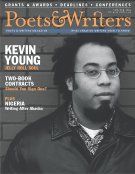Is it getting worse?
Yeah. It is very bad. But I think gradually, with the coming of
democracy, there is a bit more activity in the economy. I think things
are just picking up gradually.
I
know there's a book drought in a lot of places in Africa. I lived in
Tanzania for a while, and there were no books, no publishers. It's
really hard for writers.
You just have to accept that, even
before you start writing. You have to accept that you are not going to
make any living from that. So writing becomes something you do just for
you, just for the sake of your ego, or because you want to be a writer,
or for whatever reason. But it is not an economic activity. Unless you
happen to be lucky and win a prize.
Was the freedom of Western writers something Nigerian writers talked about in the Abacha years?
Of course. There was a lot of support from foreign writers for Nigerian
intellectuals then. From PEN International, this writers' body. There
were a lot of conferences, invitations for Nigerian writers to come and
give talks in London, America, and Germany. So there was constant
communication between Western writers and Nigerian writers. And I think
it did a lot to encourage Nigerian writers. They could vent their
frustrations. They could speak their minds. And they knew that they
were not alone. That there was somebody somewhere who knew exactly what
they were going through. Take, for instance, Ken Saro Wiwa. When he
died, when he was hanged by Abacha in 1995, there was an international
uproar.
How did that affect the writing community in Nigeria?
A lot of people expected him to die. We knew he was going to be hanged.
It didn't come as a shock. But it showed us that this person has
reached a point where he cannot go back again. The dictator, Sani
Abacha, had reached a point where, in earnest, there was no joking with
him. There were a lot of shootings, assassinations across the country,
especially in the western part of the country where you had the center
of the antimilitary movement. So things really, really became desperate
for writers.
What kind of debt do you have to Nigerian writers—Chinua Achebe and Ben Okri?
So much. So much. They were the pioneers, and they showed us that we
could do it. They made the way for us, for the younger generation to
follow. But it doesn't necessarily mean that we have to continue
writing in the same tradition that they wrote in. If you have read my
book, you will see that it's totally different from [Achebe's] Things Fall Apart.
I try to avoid that…I don't know what to call it—that exotic stuff. I
want to write about the reality that is happening now. The use of myth
and legend and history was very traditional. Times have changed. We
didn't grow up in the villages, like they grew up. We didn't listen to
the same stories they listened to by moonlight. But we owe them a lot.
They started everything. They gained respect for us. They proved to the
world that Africans could do this thing. And they reinterpreted history
in a creative way.
A lot of postcolonial African fiction is caught up in anticolonial themes. But Waiting for an Angel isn't. Is there a new generation of writers ready to move on to other things?
Yeah. What I think is, most of this categorization—postcolonial,
postmodern, colonial—is the work of the critics. Writers just tell
stories. Then the critic will take it and say, "This is a post-colonial
story," because of the theme, or a theme that keeps reappearing. But
the writer reacts to his times. My only argument with postcolonial
literature is its use of new, exotic kind of stuff. Have you read this
guy Zakes Mda? He's a South African writer. He won the Commonwealth
Prize last year. He was writing about the coming of the white man to
South Africa and the traditional way people used to live and how it was
destroyed by the white man, and all that.
And he won the Commonwealth Prize for that?
It's well written, and it's well researched; maybe that's why he won.
But I'm against that kind of writing. It's just bullshit. That is the
kind of stuff that Achebe wrote in Things Fall Apart. Fifty
years ago. There are things to write about that are not just Africans
going about naked and all that shit. Where everybody is speaking in
proverbs. It doesn't happen. It's just not there anymore. So we just
have to write about what's happening now. I'm not saying that people
shouldn't write about history, or historical fiction. But it should be
in a way that's relevant to what's happening now. I prefer people like
J.M. Coetzee. He's quite good. Ben Okri is good. But unfortunately,
he's also not writing about immediate things. He keeps going to the
1960s. Imagine somebody writing all of his novels—not one, not two, not
three—all of them set in the 1960s in Nigeria. I mean, this guy is just
about forty years old, so why does he keep doing that? It's terrible.









